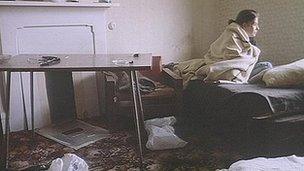Homeless accommodation: more complaints against councils
- Published

Councils are under pressure owing to an increase in homeless, says the Ombudsman
There has been a sharp increase in complaints about accommodation offered to the homeless in England, the Local Government Ombudsman (LGO) has said.
An LGO report describes a "worrying trend" of councils putting an increasing number of homeless families into bed and breakfast accommodation.
Complaints to the ombudsman have risen by 14% in two years, it said.
The Local Government Association said councils did a good job "in difficult circumstances."
The LGO said it decided to publish a number of individual stories to bring attention to the issue.
They include the case of "Bruce" - a 16-year-old who spent six months living in a tent because he refused his council's offer of bed and breakfast accommodation.
Another example is "Kim" - who lived with her young daughter in "unsuitable" bed and breakfast accommodation for 24 weeks - 18 weeks longer than the legal limit.
There is also a story of a family of five allocated a single room to live in for five months.
Extra money
The ombudsman said there had been an increase in the number of homeless people in the UK, and with it an increase in the pressure on council homelessness services.
In 2012/13, 53,540 households were accepted as being homeless, compared with 44,160 the previous year, the report said.
On 31 March 2013, there were 4,500 households in bed and breakfast accommodation compared with 2,310 on the same date in 2011.
But the government said extra money had been provided to councils to ensure that they continued to operate "one of the best support networks in the world".
Housing Minister Kris Hopkins said "Homelessness remains lower than in 27 of the last 30 years.
"The vast majority of councils are housing families effectively, but a minority need to raise their game".
The government said recent figures showed a huge variation in the way councils help homeless people, with only 15 councils accounting for nearly 80% of all families living in bed and breakfast accommodation for more than six weeks.
Earlier this year, a £1.9 million fund was launched - with help for seven of these councils to find better ways to meet the housing needs of vulnerable families.
Increasingly difficult
The LGO said the use of bed and breakfast accommodation often led to families and young people living in cramped conditions and sharing facilities with adults who may have significant problems - for example with alcohol and drugs.
Councils have a legal duty to arrange accommodation when they have reason to believe that an applicant may be homeless and in priority need.
But bed and breakfast accommodation is deemed unsuitable for families with dependent children, including pregnant women.
Councils can place families in bed and breakfast accommodation if there is no alternative, for a maximum of six weeks.
The LGO said councils complained that pressures on local authority finances were having a major impact on their ability to provide suitable housing.
Cllr Mike Jones, Chairman of the LGA's Environment and Housing Board, said:"Councils are doing a good job tackling homelessness under increasingly difficult circumstances.
"Since 2009 the use of temporary accommodation has fallen by 11%, despite the number of people approved for homelessness assistance rising by almost a third.
"The use of Bed and Breakfast accommodation is an option of last resort but with council housing waiting lists standing at 1.8 million, local authorities often have little choice but to use temporary accommodation.
"The outdated control of councils' borrowing limits is contributing to this problem. This report highlights why the Government must, as a matter of urgency, lift the borrowing cap which is preventing councils from building up to an additional 60,000 new homes over the next five years."
- Published29 August 2013